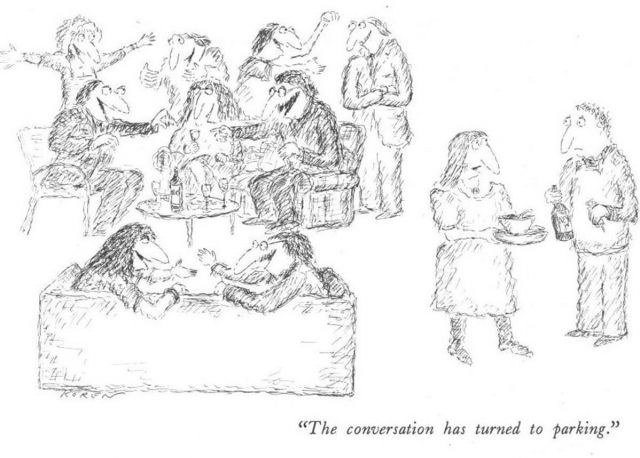Someone told me that the presidential historian David McCullough once tried to write a book about Picasso. Contract signed, he got down to business and soon learned he just didn’t like the guy, certainly not enough to spend a few years with him.
It’s a frightening prospect for any writer: You choose an idea, and then find you can’t stand the person at the center of the story.
So just imagine my good fortune that when I decided to write about parking, I found Donald Shoup. Don, who died on Thursday at the age of 86, single-handedly changed the way the world thinks about how to park cars. He loomed so large in my work that when I sat down to write about the results of the presidential contest in a Google Doc, the computer tried to finish my sentence. Surely I was writing about the election of Donald… Shoup. Alas, no. The high cost of free word processors.1
I’m sorry I didn’t show it to Shoup Dogg himself. He was funny, generous, and wise. When I wrote to him seven years ago for a story about the value of curb space, he responded: “I agree with everything you say, and I have attached an excerpt from a recent book to prove it.” There was no kinder way to tell a young reporter that he was just scratching the surface of a body of work.
He added: “I hope you will return to this topic.”
Years later, Don invited me to a conference in his honor in Seaside, Florida. I showed up early to get some tape for a podcast, and we poked around the town together, analyzing the architecture and design. At one point, when we located some of the parking that the New Urbanists (in)famously hide away, Don laughed and exclaimed: “Isn’t that a-maz-ing?” Full of wonder, always. (And also, ever-conscious of keeping his audience entertained, no doubt hamming it up a bit.)
That irrepressible curiosity—and its perseverance over so many decades—was the animating force behind his work. He was still at it this winter, dashing off op-eds and emails and chapter revisions from the study behind his Los Angeles house, a room carved out of an obsolete garage. Where else?
He was already 67 when The High Cost of Free Parking was released; a late bloomer, like Cézanne. The book made his name. In addition to dismantling many precepts of urban planning, it is laugh-out-loud funny and swimming in delightful anecdotes and unforgettable metaphors, qualities that owed much to Shoup’s relentless revisions, under the guidance of many students and the editorial expertise of his wife Pat.
Perhaps it was because he found fame late in life that Don was humble about his breakthrough and so helpful to everyone who came calling. His favorite bon mot about the field he founded—“I’m a bottom feeder, but there’s a lot of food down there”—always struck me as charmingly self-effacing, given his impact, but for a while, maybe it felt like a defense of an unloved pursuit.
Indeed, his career stands as a reminder, as we watch the crooks and buffoons in the executive branch lay siege to this country’s commitment to research, inquiry, and debate, of the value of just such pursuits. It is proof of the dividends of studying things that other people do not think are important—whether gila monster venom or parking lots.
Since I first came upon Don’s scholarship in book form, I initially underestimated his importance as a teacher. He worked at UCLA for more than half a century! His colleague Brian Taylor estimates that more than 2,000 urban planners were trained on his watch. This was hammered home for me a few months ago, when I had the privilege of writing the foreword for an upcoming book of essays on the Shoup Doctrine, edited by Don’s former student Daniel Hess. I was moved to hear from those alumni of his class. It was as if, after a lifetime of writing letters of recommendation, Don was now getting them back. Or as he put it to me: “The best part is that I’ve had the rare opportunity to edit 30 eulogies before I go.”
After all, ideas are only any good if there are people to put them into practice. In Don’s case, he inspired not just those students, not just the Shoupistas, but also an entire professional network dedicated to the perpetuation of his discoveries. We should all be so lucky, when our time on the meter runs out, to leave a legacy like his.
***
From me this last month: How Democrats can make a winning issue out of congestion pricing. Adapting infrastructure to EVs after the Bourbon Street attack. The limits of thinking about the catastrophe in Los Angeles as a “wildfire.” The radicalization of Tom Homan, Donald Trump’s border czar. A nation losing patience with its homeless neighbors. The end of “environmental justice” as a federal priority. The new politics of banning masks.
***
What I’m reading:
Streetcar Suburbs: The Process of Growth in Boston, 1870-1900 by Sam Bass Warner
Atomic Dreams: The New Nuclear Evangelists and the Fight for the Future of Energy by Rebecca Tuhus-Dubrow
Public Citizens: The Attack on Big Government and the Remaking of American Liberalism by Paul Sabin
"The Anti-Social Century” by Derek Thompson
This joke was first made by the bluesky user GiantSchleps.





Great post Henry, about Donald Shoup! I also had some contact with him over the years, although just by telephone and email. Always a great guy. His book on parking is the War and Peace on the subject. Shoup is the Tolstoy of parking! Amazing how he made such a boring subject so readable. He is an example of how you can have major impact on something by starting at the margins and working in. Hard to believe he has died. I didn’t realize he was that old. And I guess it’s another example that time continues to pass.